- Home
- H A CULLEY
Dawn of Empire Page 3
Dawn of Empire Read online
Page 3
He sighed. ‘Then I think these negotiations are at an end.’ He was about to turn his chariot and head back to his lines when Kudu-Zulush asked him to wait.
‘I’m not a fool. I know what the outcome of this battle is likely to be, though we will resist you to the end. However, I am concerned for the safety of my sons if we should lose. Will you give them shelter on the understanding that they will remain unharmed, whatever the outcome?’
Hammurabi nodded and looked behind him, beckoning Mutu-Namaha forward from where he sat on his horse next to Arishaka. Hammurabi spoke to him quietly; at first the boy looked disappointed but then he nodded and he rode forward to the chariot containing the two boys.
‘You are to come with me. I’ll make sure you don’t get hurt,’ he sneered. He had a low opinion of boys who were too precious to be risked in battle and this was aggravated by his disappointment at missing the fight himself. But at least he would be able to watch it from the hillock where the camp and the baggage train was located.
The battle opened in the conventional manner with both sides sending their chariots forward. The Babylonian light chariots split and ran up each side of the Elamite formation, the archers concentrating on the onagers. This brought a third of the enemy’s heavy chariots to a halt and those behind either crashed into them or swerved to avoid them, opening up gaps in their line. The Babylonian heavy chariots crashed into them next whilst the camel archers wreaked further havoc. When the Elamite chariots withdrew they left behind half their strength for the loss of no more than a few Babylonian chariots and camels.
Kudu-Zulush sent his infantry forward next. Although they outnumbered the Babylonian foot by almost nineteen thousand to ten thousand spearmen they had left their archers to protect their king and the baggage train. The Babylonian foot archers and the slingers ran to the front of the massed ranks of spearmen and started to whittle down the front ranks of the attackers. Then the camel archers launched flying attacks on the flanks of the enemy infantry, causing them to bunch up in the centre. This was the intended effect as they got in each other’s way as they continued the advance. Suddenly the right flank caved in. The chariots and camel archers from the Babylonian cities of Kish and Borsippa had attacked from the west.
Panic began to spread amongst the packed ranks of Elamite spearmen and they started to stream away in the only direction they could: toward the river. Throwing away their weapons and any armour they had, they plunged into the wide, swift flowing waters. A few made it to the far bank but most were swept away and drowned.
About twelve thousand spearmen stood their ground and Hammurabi was content to allow his archers, both foot and camel born, to shoot them down from a distance. Arishaka rode up to remonstrate with his brother.
‘This is plain and simple murder. They don’t stand a chance.’
‘What do you suggest brother? I let them go so that they can join the other thirty or forty thousand that are marching to Eshnunna as we speak?’
‘What? How do you know that?’
‘Kudu-Zulush was foolish enough to tell me. That’s why he couldn’t accept my terms for surrender.’
‘At least call off the slaughter and allow them to surrender now!’
Hammurabi nodded. ‘I don’t like this any more than you do but I do need to make sure that this army won’t be a threat to us in the future.’
Once Arishaka had managed to bring his archers to heel, Hammurabi called upon the remaining eight thousand men to surrender. There was a long pause before one man dropped his spear and shield and threw his helmet, crowned with a proud display of feathers indicating his rank, away in disgust. A few more followed the officer’s example and then the few became a flood. Leaving Arishaka to take care of his captives, Hammurabi rode over to the Elamite camp where he found Kudu-Zulush guarded by his archers. By now the troops who had arrived from the west and the north had surrounded the camp.
The King of Babylon accepted the surrender of the King of Susa and sent him under escort to the governor’s palace in Upi. The archers were disarmed and sent to join the rest of the captives.
‘Well, that’s the end of that,’ Arishaka remarked to his brother that evening.
‘Far from it; I suspect that it is merely the beginning of a long struggle.’
Chapter Three – Preparations for War – 1769 BCE
The rest of the year passed quietly enough. Samsu-Iluna had returned from Mari flushed with success at getting its king, Zimri-Lim to sign a treaty promising his support for Babylon in the event that the Elamites crossed the Tigris. Siwe-Palar-Hupak had arrived at Eshnunna and had moved his seat of government there, at least in the short term. It wasn’t clear whether he was ruling Eshnunna directly or whether he had appointed a puppet king.
‘Can’t Sin-Bel-Alim find out?’
Sin-Bel-Alim was the Babylonian foreign minister who ran a network of agents throughout Mesopotamia and the neighbouring lands. But he was getting old now, as was Isiratuu, the chief minister. Hammurabi had thought of Abi-Maras as his replacement as chief minister but he was too valuable to the army. Perhaps his younger brother might be worth training up. He was about to mention the matter to Adiar when they were interrupted by the arrival of a messenger.
After the battle of Upi, Hammurabi had strengthened the city’s garrison and departed with the army and the thousands of captives. He knew that they would be a glut on the market so he divided them up and sent them to the slave markets in Yamhad, Mari and Sumeria as well as all the Babylonian cities. He had released Kudu-Zulush but kept his two sons as hostages. He calculated that it was better to have a man on the throne of Susa over whom he had a hold, rather than kill him.
He needn’t have bothered. A messenger had come from one of Sin-Bel-Alim’s agents with the news that Siwe-Palar-Hupak had executed his vassal, the King of Susa, in the central square of Eshnunna for losing him a whole army and for failing to take Upi. Not only had Hammurabi lost a useful pawn in the game but he was now saddled with two young orphans for which he had no further use.
Mutu-Namaha had despised the two Elamite boys at first. They were despondent and unresponsive. He had tried to involve them in what he did in the training camp but they just clung to one another, whispering and distrustful. Hammurabi’s son thought that they were soft and needed to show a great deal more fortitude. After all, they were only hostages and would soon be returned to their father.
His attitude started to change when he heard about the execution. He wondered what would happen to them now. Strangely, once they had got over the shock of his death, the two boys behaved as if a weight had been lifted from their shoulders.
‘We feared that we would be killed, perhaps unpleasantly, if our father didn’t do what your father wanted. We loved him and, of course, we grieve for him. But what we want most of all now is revenge for the dishonourable way that Siwe-Palar-Hupak had him killed. We are no longer of use to your father, so he may still kill us, but perhaps he will let us join your army instead so that we can fight against the man who murdered our father.’
The Babylonian boy was impressed by the fierceness and sincerity with which this was said. Slowly he nodded. ‘I will speak to my uncle and see what can be arranged.’ Then he turned back to the two boys. ‘I don’t even know your names or how old you are.’
‘Mine is Naram-Suen and this is Uktannu; I’m fifteen and he’s thirteen. I know that you are called Mutu-Namaha but I don’t know how old you are.’
Mutu-Namaha stood up straight. He was taller than Uktannu and more heavily built than either of the two Elamites. ‘I’m twelve, younger than both of you, but I don’t feel as if I am younger than you; perhaps it is the different ways that we have been brought up.’
The two brothers nodded. Narem-Suen smiled slightly as he replied ‘We were perhaps too pampered as princes in Susa. The last two months have been especially hard for us, but we have seen that you are treated as a young man, not a child, and that’s what we want too – if we are allowed to li
ve.’
~#~
In the end it was decided to spare the two sons of the executed Kudu-Zulush and they were assigned as aides to learn from those they assisted: Dadanum the commander of the camel troops in the case of Naram-Suen and Abi-Maras for Uktannu. Although they served different men and the young Elamites lived in the houses of their respective masters in the city, the three boys spent what little free time they had in each other’s company and started to become firm friends.
The situation between Babylonia and Elam seemed have reached a stalemate. Each stuck to their own side of the River Tigris and, for a time, there seemed to be an unofficial truce between the two kingdoms. Towards the end of the year Arishaka decided to organise a hunt. There wasn’t much game in the barren hinterland away from the various rivers and the cultivated fields, pasture and groves that bordered them, but recently shepherds had complained that a wild animal was taking their sheep and goats. It had only been seen at a distance but from those glimpses and the claw marks on the dead animals, Arishaka thought that it sounded like a lion, or more likely a lioness as the female was the one that usually did the hunting.
The hunt was to be on horseback and twenty men were chosen to accompany Arishaka. Samsu-Iluna, Mutu-Namaha, Naram-Suen and Uktannu were allowed to follow the hunting party with an escort of five camels and their archers. The boys had started their training with weapons and so they were allowed to carry a spear and a shield for protection, not that anyone thought that they would need them.
The tracker followed the lioness’s trail from its most recent kill into the barren brown hills to the north east of Babylon. After a while he lost the trail and the horsemen spread out to search for the lioness’s den. Arishaka believed that this wouldn’t be far away from the populated areas, but by the time that they had crossed the ridge and lost sight of the Euphrates valley, he began to wonder whether they had missed the den.
The four boys and their escort followed the screen of horsemen at a distance of four hundred yards. Just after Arishaka and his men had dropped out of sight the other side of the ridge, Naram-Suen thought that he had caught a glimpse of yellow fur in a cleft between two rocks and turned his horse towards it to investigate. This alarmed their escort and they tried to stop the boys going further, but it is difficult for a man sitting on top of the hump of a camel to stop a determined boy on a horse.
One camel was sent over the ridge to tell Arishaka that the lioness might have been sighted, whilst the other four notched arrows to their bows ready to protect the boys. They had now reached the cleft in the rocks and the boys held their spears and shields ready in case the lioness came out to attack them. But the lioness wasn’t there. She had crept up on top of the rocks and lay there, unseen by the four boys sitting on their horses immediately below it.
Suddenly she launched itself off the rock aiming to land on the unsuspecting Samsu-Iluna. Luckily the reactions of both Naram-Suen and one of the archers were extraordinarily fast. In the split second that the lioness was in mid-air before landing on Hammurabi’s heir, one of the archers put an arrow in its side and the Elamite youth thrust his spear into her mouth and up into her brain. Samsu-Iluna just had time to swing his shield up between his body and the dying lioness before it landed on him, knocking him and his horse to the ground.
By the time that Arishaka and his men had joined them, a shaken but unharmed Samsu-Iluna was back on his feet and someone had put his horse, which had suffered a broken leg in the fall, out of its misery. The other boys were busy skinning the lioness before presenting the pelt to Naram-Suen.
‘If there is a lioness here then there are probably cubs in the den nearby, who she was trying to protect.’ Arishaka was correct, and thirty minutes later his men brought three spitting and clawing balls of fur to him. He immediately ordered their throats cut.
The boys were horrified. ‘Stop! Can’t we take them and rear them?’ Samsu-Iluna asked.
‘You can’t tame wild lions. If we leave them here they will die a slow and painful death from starvation; is that what you want? You certainly can’t tame them. When they are older they will hunt just like their mother did. If you try to rear them you will probably be their first meal!’ He smiled grimly. ‘There is a time for sentiment, but this isn’t one of them.’
‘If they are to die then we will do it,’ Mutu-Namaha said after they boys had thought about what Arishaka had said.
When Hammurabi was told the tale he praised Narem-Suen for his courage and his quick thinking. He thought to himself how lucky it as that he had spared the two young Elamites, not that he had seriously considered killing them. Adiar had a completely different reaction, blaming both Arishaka for taking her sons on the hunt and Hammurabi for praising them for killing the lioness. Then she rounded on her sons for putting themselves in danger. However, she did have the grace to thank Naram-Suen for saving Samsu-Iluna’s life once she had vented her anger at everyone.
~#~
‘Have we heard anything yet from the embassy we sent to Larsa?’ Hammurabi was in council with Adiar and his senior advisors again. He was getting restless at the lack of progress in negotiations with Rim-Sim, the King of Sumeria.
‘Not yet, lord king.’ Sin-Bel-Alim was now in his sixties and in poor health. Hammurabi had tried to persuade him to retire, but the old man said that he was determined to carry on working until he died. Hammurabi feared that day could not be far off. He had recently lost Tarhunda, the Hittite who had commanded his army until Arishaka was old enough to take over. Typically the man had been breaking in a new horse when he had suddenly collapsed and died. As Adiar had remarked when she was told, ‘It’s just the way he would have wanted to go.’
Isiratuu had also insisted that he was fit enough to carry on as first minister for a while yet, though, in his case, he seemed as fit and sprightly as ever, despite the fact that he was even older than the foreign minister.
Hammurabi had sent an embassy to Larsa two months ago to propose a treaty whereby each king would support the other if invaded by Elam, but Rim-Sim seemed in no hurry to respond. He couldn’t think of a way to hurry things along, so he put it to the back of his mind.
‘There is some news from the north though,’ Sin-Bel-Alim went on. ‘Hiritum is being besieged by Elam and Eshnunna.’
‘Hiritum?’ Samsu-Iluna was sitting beside his father in the council meeting. Ever since he had turned sixteen he had been part of the royal council as part of his training to be Hammurabi’s eventual successor. His father nodded at Sin-Bel-Alim, who patiently explained the situation.
‘It is an independent city state that sits on the Tigris between Eshnunna and Mari. It has land on both sides of the river and, unlike most of its neighbours, it has avoided being assimilated within either kingdom so far. The city itself sits on the west bank of the river and therein lies its value to Elam: it would be a useful bridgehead if they decided to invade Mari.’
‘And what is its value to us?’ the king’s son wanted to know.
‘We have a treaty with Mari, and although they didn’t come to our aid over Upi, we can’t afford to let Mari fall into Elamite hands. However, I don’t think that Elam intends to invade Mari; it would be a move too far, even for them. No, they just want to threaten Mari so that its king, Zimri-Lim, is forced to break his treaty with us. We would then be isolated from our allies in the north; not just Mari, but Yamhad as well.’
‘So we have to go to the aid of Hiritum?’
‘It would seem so,’ his father replied.
‘You can’t keep calling up the militia to go to the aid of cities with which we don’t even have a treaty,’ Adiar objected. ‘The farmers are needed on the land and the city dwellers all have trades or other jobs. It would be different if Babylon was invaded, of course.’
Hammurabi looked at his queen thoughtfully. ‘You have a point, my dear. I have a feeling that this conflict with Elam won’t be over quickly.’ He turned to Abilkisu, his treasurer. ‘How much do we have in the vaults now?�
��
Abilkisu looked uncomfortable. ‘The taxes for this year are still being collected, lord king, and we have to pay the standing army as well as fund all your building and irrigation projects, of course.’
‘I didn’t ask what we spent money on, how much have you managed to amass as reserves since I came to the throne when I seem to recall the treasury was all but empty?’
Hammurabi trusted Abilkisu implicitly. The man was honest and a miser; two essential qualities for a good treasurer.
‘Perhaps twenty thousand talents over and above the requirements for the rest of the year,’ Abilkisu eventually admitted. Even Hammurabi, who took little interest in finances, provided he had enough funds for what he wanted to do, was staggered. Twenty thousand talents equated to roughly six hundred tons of gold.
‘You old skinflint!’ Hammurabi beamed at him, after he had recovered from the shock. ‘How did you manage to accumulate so much?’
‘Well, we collect taxes properly and I make sure that none of it sticks to the collectors’ fingers; you’ll recall that we had to execute a few when you first became king and the rest soon got the message. Every year I have managed to add more to the reserves and you have ruled for twenty three years now. As Babylon has expanded its territory, our trade has increased and the produce from the land has improved so much that we sell much more than we consume; and then there was the sale of all those slaves last year. ’
‘So how much does the army cost at present?’
‘Well, let me see. There’s the standing army, the training camp, new equipment, food, the payment to the archers and...’
‘Yes, yes, I didn’t ask for a detailed breakdown, just the total annual cost.’
‘Well, about a thousand talents each year.’
‘So we have enough in reserves to pay for the army for the next twenty years.’
‘Perhaps, but we have to guard against poor years and unexpected expenditure.’

 The Wolf and the Raven
The Wolf and the Raven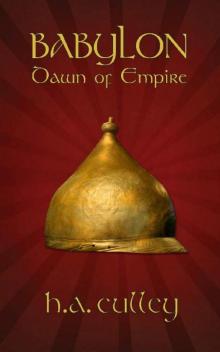 Dawn of Empire
Dawn of Empire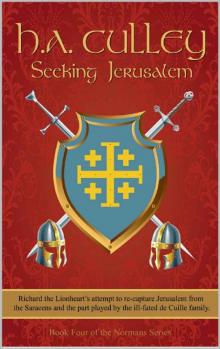 Seeking Jerusalem
Seeking Jerusalem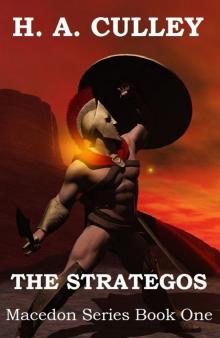 The Strategos
The Strategos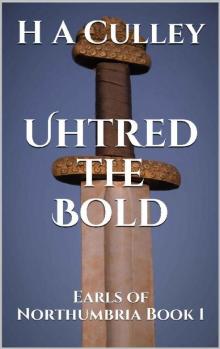 Uhtred the Bold
Uhtred the Bold The Path to the Throne
The Path to the Throne The Bastard's Son
The Bastard's Son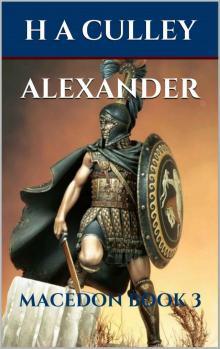 Alexander
Alexander The Great Heathen Army
The Great Heathen Army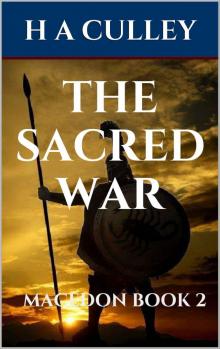 The Sacred War
The Sacred War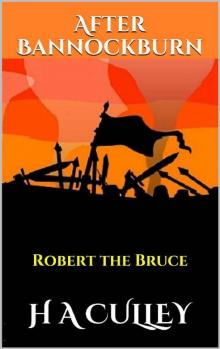 After Bannockburn
After Bannockburn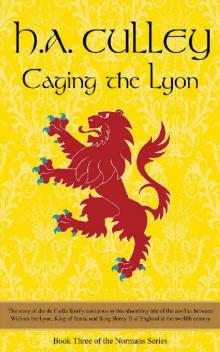 Caging the Lyon
Caging the Lyon The Bastard's Crown
The Bastard's Crown WHITEBLADE
WHITEBLADE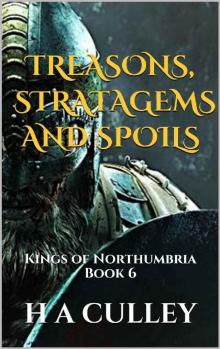 TREASONS, STRATAGEMS AND SPOILS: Kings of Northumbria Book 6
TREASONS, STRATAGEMS AND SPOILS: Kings of Northumbria Book 6 THE POWER AND THE GLORY: Kings of Northumbria Book 4
THE POWER AND THE GLORY: Kings of Northumbria Book 4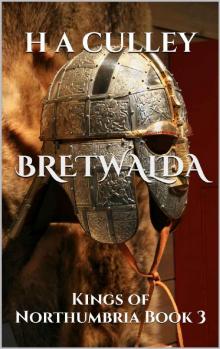 BRETWALDA: Kings of Northumbria Book 3
BRETWALDA: Kings of Northumbria Book 3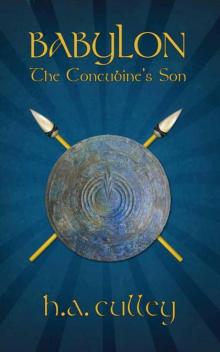 The Concubine's Son
The Concubine's Son The Fall of the House of Æthelfrith: Kings of Northumbria Book 5
The Fall of the House of Æthelfrith: Kings of Northumbria Book 5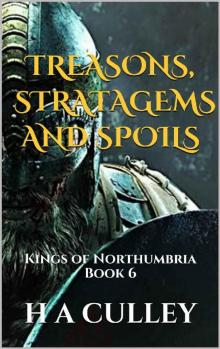 TREASONS, STRATAGEMS AND SPOILS
TREASONS, STRATAGEMS AND SPOILS THE POWER AND THE GLORY
THE POWER AND THE GLORY WARRIORS OF THE NORTH
WARRIORS OF THE NORTH The Fall of the House of Æthelfrith
The Fall of the House of Æthelfrith WARRIORS OF THE NORTH: Kings of Northumbria Book 2
WARRIORS OF THE NORTH: Kings of Northumbria Book 2 WHITEBLADE: Kings of Northumbria Book 1
WHITEBLADE: Kings of Northumbria Book 1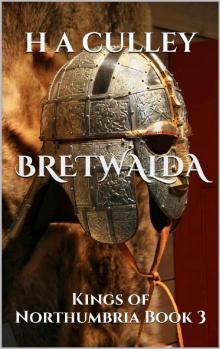 BRETWALDA
BRETWALDA